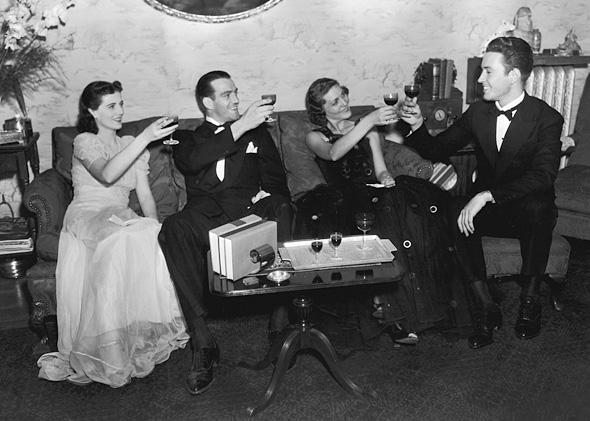On a recent late-summer evening in New York, a group of friends gathered on a verdant 16th floor terrace to enjoy the unseasonably cool breeze. The couple who own the apartment, in addition to being skilled (or at least lucky) gardeners, are noted for having “entertaining”—that ancient human ritual of letting other people into your shelter, usually for food, drink and/or some kind of amusement—down to a science. The more practical of the pair attended to a few basic but essential details; this particular evening, that meant quickly made gin and tonics, a pleasing but unobtrusive playlist of Motown classics, and softly glowing hurricane lamps. Meanwhile, the more artistic partner handled things in the kitchen: freshly blended pesto and salty pasta, a crisp, well-dressed salad, three simple cheeses, and a proper French baguette from the bakery a few blocks down. Being an ardent Francophile, the practical host insisted on this last bit, in addition to offering hot coffee and a little cognac or Grand Marnier to his guests as their genial chatter rose with the moon over a glittering Triborough Bridge. After saying goodnight, the guests felt, as they had many times before, a great deal of affection for their hosts and walked home indulging the suspicion that a cozy, well-considered dinner party was surely the most delightful form of human interaction imaginable.
Whether you agree with that assessment or not will go a long way in determining how you feel about Guy Trebay’s eulogy for the dinner party in the New York Times last November. If you believe Trebay, people have all but given up entertaining their loved ones at home in favor of Saturday evenings spent lounging “in their sweat pants while juggling an iPad, a remote wand and the chopsticks that they use to share General Tso’s chicken eaten straight from the carton.” As Trebay grimly summarizes: “The seated dinner, with its minuet of invitation and acceptance, its formalities and protocols, its culinary and dietary challenges, its inherent requirements of guest and host, alike is under threat.”
Of course, the proper dinner party is not the only genre of entertaining, but if you listen to the depressing whispers of the zeitgeist, other strains, such as the overnight stay, the weekend jaunt, and even the low-key house party, are all on the way out as well. To blame? Restaurants and the Internet and the recession and general misanthropy and Netflix binge-watching and Lord-only-knows what other lazy excuses. Perhaps the sad truth is that the only way we will “entertain” one another in this brave new century is with overwrought bon mots typed nervously in the hopes of a meager “like” or “retweet.”
Or perhaps we just need to get it together, people. Fact is, this declinest narrative will find no quarter in the pages of Slate. Entertaining can and should remain a vital and vivacious part of the human experience, and we plan to do our part to make it so with this series, a compendium of 20 posts that will appear over the next four weeks. But “The New Rules for Entertaining” will not just be a gut-punch of tough love; we understand that a big part of the problem is that many of us have been out of the hospitality game for so long that our silver-polishing and shrimp-cocktail-arranging and conversation-making muscles have grown stiff. And indeed, in that down time, much has changed—for example, no one should really bother with stuffy fine silver and played-out cocktail sauce anymore (unless, of course, that’s your thing).

Illustration by Lisa Larson-Walker
So consider the forthcoming set of rules a series of salutary stretches. As with any new set of exercise moves, some will be bracingly novel while others represent gentle updates of old standbys. All, however, are guaranteed to be good for your social health. Now, where to begin? It should probably go without saying, but the fundamental question is worth addressing: To entertain, or not to entertain? Of course, we say, without fear, doubt, or interest in any retort, ENTERTAIN.
But, being of a critical bent, we find it more interesting to ponder why a smart, interesting, likeable person like you would find yourself mulling that question in the first place. Luckily, Dorothy Draper, an expert in the field of entertaining who published one of the canonical texts on the art form in 1941, offers a ready explanation: she called it, unsympathetically and with Nietzschean assuredness, “the will to be dreary.” And quite right she is. All the hemming and hawing one encounters these days concerning “how much trouble” it would be to have a few friends over for a simple dinner, cocktails, or even (Dorothy, cover your ears) take-out is indeed dreary and, might we add, extremely tiresome.
So, Lesson One: Stop being dreary. Giving a party need not be fussy or expensive or overly time-consuming, but, at some point, you will have to go buy the flowers (or Prosecco or whatever) yourself—which, we concede, might involve some amount of stress, that natural part of life that we are for some reason taught today to avoid at all costs. Or you might choose, as we do, to call the feeling excitement, for what could be more thrilling than taking a few hours out of your life and a little money out of your wallet to create a special occasion for your loved ones?
Highlight that: Special occasions are not organic occurrences; they must be created. And it is our firm belief that the world would be a better place if more of us would give it a shot, whether as generous hosts or as willing guests. We hope what follows will prove useful guidance for those in either position, and, ultimately, serve to revivify entertaining in our society like a piquant sorbet on a sleepy palate.
Won’t you join us?
